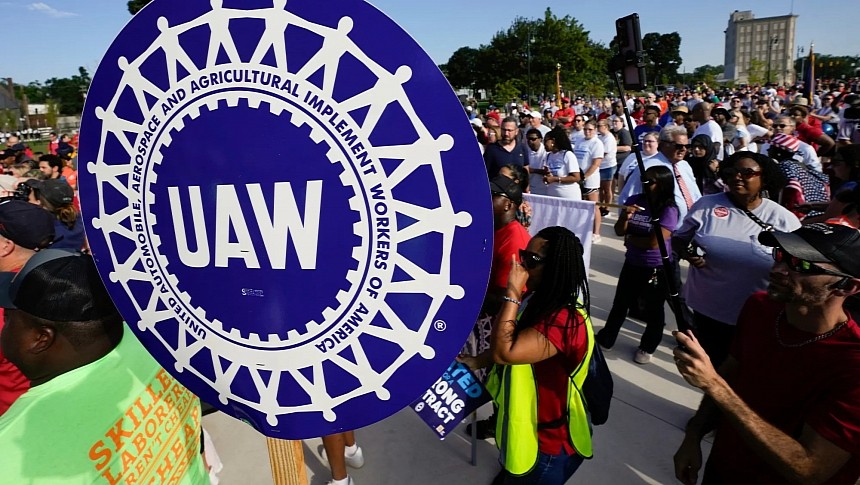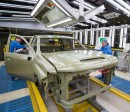There's a storm brewing in the waters off the coast of Detroit. And no, we're not talking about the one that wrecked the Edmund Fitzgerald. But with the American auto sector stationed in the city still reeling from a global health crisis and subsequent supply chain armageddon, another wave of turmoil seems dead set on wreaking havoc on the American automotive sector. This time, contentions between the union representatives of America's vital auto workers and their employers seem ready to deal the U.S. auto sector another savage blow. Safe to say, this doesn't bode well for national car prices.
Headquartered off the banks of the Detroit River, United Auto Workers (UAW) represents all of America's nearly 400,000 active automotive sector workers as well as those across the river in Southern Ontario, Canada, a major hub for Detroit-based manufacturers like Stellantis, Ford, and General Motors. The UAW's reach isn't just limited to domestic automakers. Every American worker from Honda to BMW and everything in between is covered, as are upwards of half a million retirees.
Tensions flared in the latest round of union negotiations between the UAW and auto-industry representatives from Detroit's big three. It's to the point that fears of a complete and total union strike by the UAW when their contract expires on Sept. 14th of this year aren't out of the question even slightly. On the agenda at the latest meetings was a list of requests by UAW to increase salaried and hourly position wages by 46 percent, a restoration of traditional worker pensions absent from the sector in recent years, and a contract clause that pays 40 hours worth of pay for only 32 hours of work. According to the representatives from all three of Detroit's big auto giants, these demands are a bridge too far.
General Motors, in particular, was starkly and harshly opposed to UAW's contractual requests. The presiding belief by company reps is that such changes would affect GM's ability to keep up with manufacturing demands. GM's head of global manufacturing, Gerald Johnson, indicated such in a public statement as first reported by Reuters. In this statement, Johnson declared the UAW's list of demands carries "significant costs attached that would threaten our ability to maintain our manufacturing momentum." At a time when the American auto sector is the most vulnerable it's been since the 2008 financial crisis, it's very much up in the air whether such sentiments are mere hyperbole or rooted in facts.
For an American economy full of workers struggling to pay the bills, such a strike could spell bad news for those hoping national prices for new cars would plateau and one day decrease. With no workers left to manufacture new vehicles in the wake of a strike, a potential directly proportional increase in new vehicle prices could keep a great deal of lower-income North Americans out of the new car buying process indefinitely. But with UAW representatives steadfast in their drive to provide North America's auto workers with as healthy compensation as possible, the whole situation reeks of another unstoppable force vs. immovable object scenario where, ultimately, something's got to give eventually.
Would such a strike mirror the vitriol and ferocity of the SAG-AFTRA and Writer's Guild of America? The answer to said question remains to be seen. Hopefully, it'll never come to pass at all. Lest the cost of an entry-level crossover SUV slip even further out of reality for most working-class North Americans.
Tensions flared in the latest round of union negotiations between the UAW and auto-industry representatives from Detroit's big three. It's to the point that fears of a complete and total union strike by the UAW when their contract expires on Sept. 14th of this year aren't out of the question even slightly. On the agenda at the latest meetings was a list of requests by UAW to increase salaried and hourly position wages by 46 percent, a restoration of traditional worker pensions absent from the sector in recent years, and a contract clause that pays 40 hours worth of pay for only 32 hours of work. According to the representatives from all three of Detroit's big auto giants, these demands are a bridge too far.
General Motors, in particular, was starkly and harshly opposed to UAW's contractual requests. The presiding belief by company reps is that such changes would affect GM's ability to keep up with manufacturing demands. GM's head of global manufacturing, Gerald Johnson, indicated such in a public statement as first reported by Reuters. In this statement, Johnson declared the UAW's list of demands carries "significant costs attached that would threaten our ability to maintain our manufacturing momentum." At a time when the American auto sector is the most vulnerable it's been since the 2008 financial crisis, it's very much up in the air whether such sentiments are mere hyperbole or rooted in facts.
For an American economy full of workers struggling to pay the bills, such a strike could spell bad news for those hoping national prices for new cars would plateau and one day decrease. With no workers left to manufacture new vehicles in the wake of a strike, a potential directly proportional increase in new vehicle prices could keep a great deal of lower-income North Americans out of the new car buying process indefinitely. But with UAW representatives steadfast in their drive to provide North America's auto workers with as healthy compensation as possible, the whole situation reeks of another unstoppable force vs. immovable object scenario where, ultimately, something's got to give eventually.
Would such a strike mirror the vitriol and ferocity of the SAG-AFTRA and Writer's Guild of America? The answer to said question remains to be seen. Hopefully, it'll never come to pass at all. Lest the cost of an entry-level crossover SUV slip even further out of reality for most working-class North Americans.









